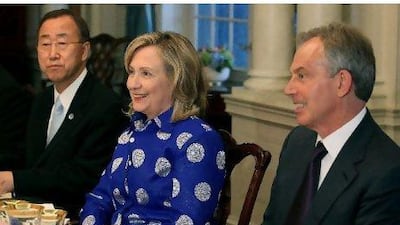WASHINGTON // Middle East Quartet envoys meeting in Washington say "tough decisions" still need to be made to close the gaps between Palestinians and Israelis and bring them back to negotiations, according to a senior US administration official.
Representatives of the UN, Russia, the EU and the US met over a two-hour working dinner on Monday evening at the state department. Tony Blair, the Quartet's special envoy, also attended.
An administration official said afterwards that "tough decisions" were needed on both sides to secure a return to negotiations. The envoys, the official said, decided that more work needed to be done to close those gaps that were "impeding" progress, but that the Quartet remained committed to continuing "their intense engagement" with the parties.
The official declined to give details of the gaps, but said it was ultimately up to the Israelis and Palestinians to revive progress.
No official statement was made after the meeting.
The Palestinian Authority president, Mahmoud Abbas, said yesterday that he would take the Palestinian bid for statehood to the UN after the Quartet failed to reach a breakthrough.
"We will go to the United Nations and we hope the United States will not use its veto, but that we will go with its agreement," the Palestinian leader said after a meeting with the Greek president, Karolos Papoulias, in Ramallah. "The fact that there is no statement from the Quartet is a negative indication that there is deep division between them."
The Palestinian negotiator, Saeb Erakat, said "there is no other option but to support the Palestinian plan to go to the United Nations to seek full membership for the state of Palestine on the 1967 borders".
He rejected any attempt to equate the Palestinian and Israeli sides and criticised any suggestion the two parties were equally to blame for the stalemate in negotiations, which have been on hold since last September.
The US official said the Quartet had decided more "quiet diplomacy" was needed to bring the parties closer first. The Quartet, the official added, remained committed to the framework for a solution that Barack Obama, the US president, laid out in May. The official also said it was not clear what the Palestinians intended to accomplish at the UN in September, where the Palestine Liberation Organisation has said it will seek admission as a full member.
For now, the official said, the Quartet, the international community and "certainly the United States is putting its emphasis on exploring whether, by closing gaps between the parties, we can give the alternative of a negotiation real traction".
Earlier on Monday, Hillary Clinton, the US secretary of state, had said after meeting Catherine Ashton, the EU's foreign policy chief, that the US firmly believed that the only way toward a two-state solution was through negotiations rather than the UN.
"What we strongly advocate is a return to negotiations, because a resolution, a statement, an assertion, is not an agreement. And the path to two states living side by side in peace and security lies through direct negotiations."
* With additional reporting by Agence France-Presse

